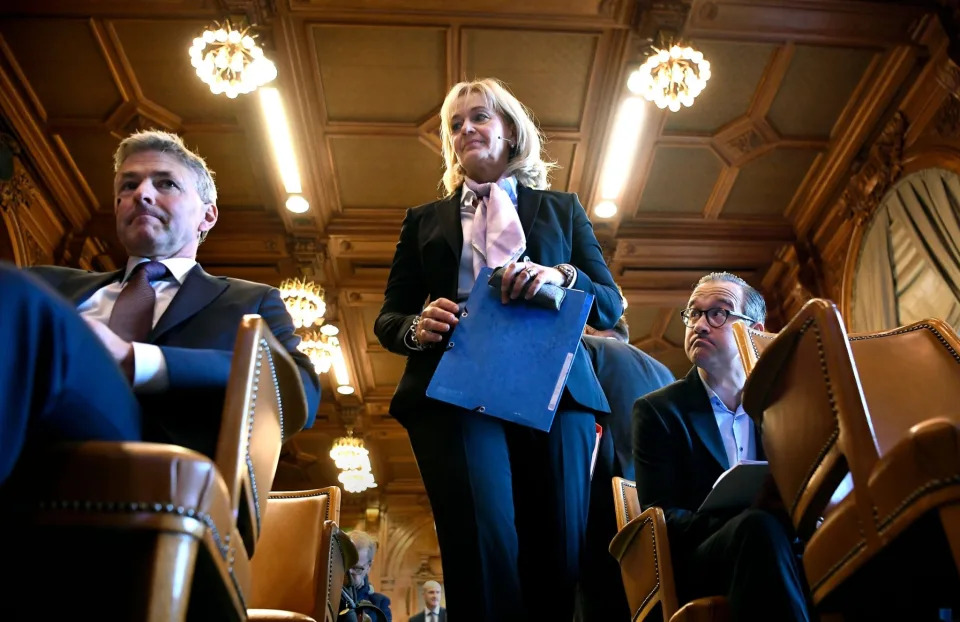August Graham,
PA Business Reporter
Mon, 4 March 2024

A wind farm majority owned by energy company EDF will pay £5.5 million into a fund designed to help vulnerable customers after regulator Ofgem found that it had overcharged the grid.
Ofgem said that EDF’s Dorenell Windfarm Limited (DWL) charged “excessive prices” when it was asked to reduce its output.
Wind farms are normally paid for the electricity that they produce and send into the grid. But sometimes, when the grid is too full to take on more electricity, the wind farms are paid to turn off their turbines.
“Ofgem considers that DWL charged excessive prices to reduce output where this was required to keep the system balanced, and the breach pushed up costs for consumers,” Ofgem said in a statement on Monday.
The regulator said that some of the assumptions used by the company were higher than necessary to recover its costs. Meanwhile its prices “did not properly reflect the financial benefits of reducing its output”.
The business told Ofgem that it thought it had complied with the rules, but accepted the regulators’ findings and will pay £5.5 million towards its voluntary redress fund – a scheme set up to help struggling households.
Ofgem director of enforcement Cathryn Scott said: “Another win for customers through Ofgem’s robust enforcement work has been secured.
“This company has accepted its error and has agreed to make a significant payment to put it right.
“Customers – particularly those in vulnerable situations – will rightly benefit from over £5 million as a direct result.
“We hope this sends a clear message that licence breaches will simply not be tolerated.”
The Dorenell wind farm has 59 wind turbines and is just off the A941, south of Dufftown, Moray, in the north-east of Scotland.
A spokesperson for the wind farm said: “Dorenell Windfarm Limited takes compliance seriously and aims to comply with regulations at all times.
“DWL reviews its practices regularly and adapts as necessary. At all times throughout this review, DWL has engaged actively with Ofgem and cooperated fully to resolve the issue.
“DWL accepts it made an unintentional breach of the Transmission Constraint Licence Condition (TCLC). As a result, DWL has changed its bid pricing policy to avoid any future breaches.”
Mon, 4 March 2024

A wind farm majority owned by energy company EDF will pay £5.5 million into a fund designed to help vulnerable customers after regulator Ofgem found that it had overcharged the grid.
Ofgem said that EDF’s Dorenell Windfarm Limited (DWL) charged “excessive prices” when it was asked to reduce its output.
Wind farms are normally paid for the electricity that they produce and send into the grid. But sometimes, when the grid is too full to take on more electricity, the wind farms are paid to turn off their turbines.
“Ofgem considers that DWL charged excessive prices to reduce output where this was required to keep the system balanced, and the breach pushed up costs for consumers,” Ofgem said in a statement on Monday.
The regulator said that some of the assumptions used by the company were higher than necessary to recover its costs. Meanwhile its prices “did not properly reflect the financial benefits of reducing its output”.
The business told Ofgem that it thought it had complied with the rules, but accepted the regulators’ findings and will pay £5.5 million towards its voluntary redress fund – a scheme set up to help struggling households.
Ofgem director of enforcement Cathryn Scott said: “Another win for customers through Ofgem’s robust enforcement work has been secured.
“This company has accepted its error and has agreed to make a significant payment to put it right.
“Customers – particularly those in vulnerable situations – will rightly benefit from over £5 million as a direct result.
“We hope this sends a clear message that licence breaches will simply not be tolerated.”
The Dorenell wind farm has 59 wind turbines and is just off the A941, south of Dufftown, Moray, in the north-east of Scotland.
A spokesperson for the wind farm said: “Dorenell Windfarm Limited takes compliance seriously and aims to comply with regulations at all times.
“DWL reviews its practices regularly and adapts as necessary. At all times throughout this review, DWL has engaged actively with Ofgem and cooperated fully to resolve the issue.
“DWL accepts it made an unintentional breach of the Transmission Constraint Licence Condition (TCLC). As a result, DWL has changed its bid pricing policy to avoid any future breaches.”













